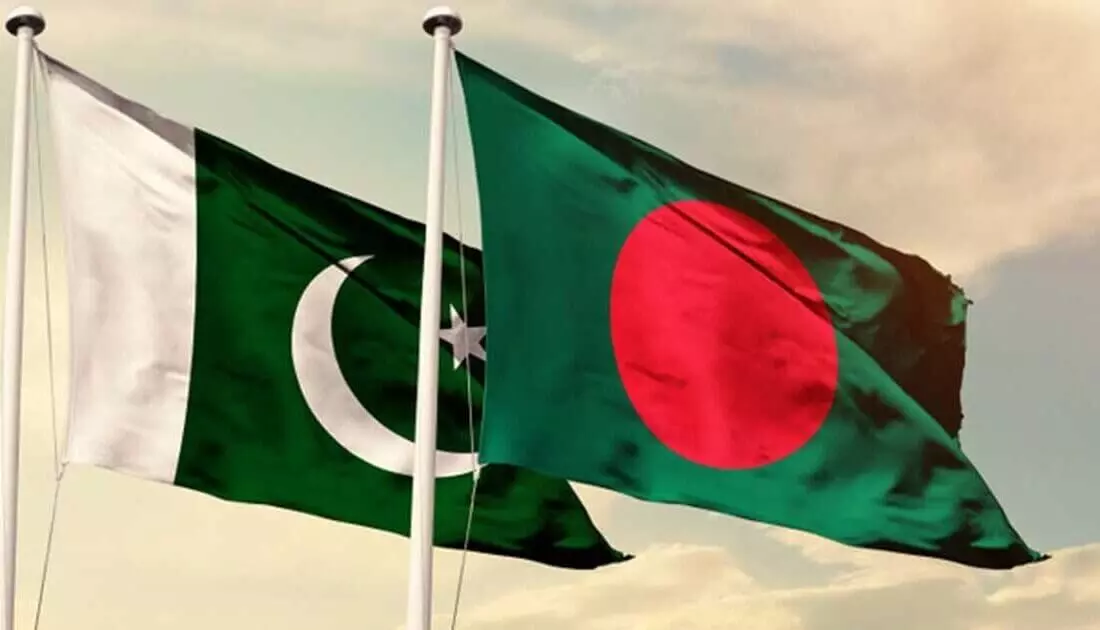Tensions with India, closeness with Pakistan! Dar's visit to Dhaka and its strategic implications

The growing diplomatic proximity between Bangladesh and Pakistan has created a new stir in international politics. Amid India-Bangladesh tensions, Pakistan's Deputy Prime Minister and Foreign Minister Ishaq Dar announced that he will visit Bangladesh in February, the first official visit by a Pakistani minister since 2012. This development holds special significance amid the anti-India stance of the interim government led by Mohammad Yunus in Bangladesh.
Dar made this announcement a few weeks after Pakistan Prime Minister Shahbaz Sharif and Chief Advisor of Bangladesh's interim government Muhammad Yunus met on the sidelines of the D-8 summit in Cairo last month.
Reports published in the media said that Dar will be the first foreign minister of Pakistan to visit Dhaka in more than a decade. Earlier, Hina Rabbani Khar was the last foreign minister of Pakistan to visit Dhaka in 2012. Dar said in a press conference in Islamabad on Thursday that he will leave for Dhaka on or after February 5.
The visit of Pakistan's Foreign Minister to Bangladesh is considered significant at this time. Ever since India gave asylum to former Prime Minister Sheikh Hasina, a contradictory feeling has been seen towards India in neighboring Bangladesh. At such a time, there is talk that Bangladesh, angry with India, is now moving towards building close relations with countries like Pakistan and China. Similarly, sensing the opportunity, Pakistan is also ready to get Bangladesh on its side. Pakistan is making every possible effort to increase closeness with Bangladesh. Also, Bangladesh is now seen openly supporting Pakistan. The possibility of strategic and diplomatic reasons behind this love for Bangladesh within Pakistan cannot be ruled out.
At the same time, Bangladesh had asked Pakistan to resolve the 1971 issues to help Dhaka advance its ties with Islamabad 'forever for future generations'. Yunus urged Sharif to resolve the 1971 issues to help Dhaka advance its ties with Islamabad and said: 'Issues have been coming up again and again. Let's resolve those issues to move forward.' Relations between Pakistan and Bangladesh remained strained during Sheikh Hasina's 15-year tenure.
On the other hand, Since Yunus's government came to power in Bangladesh, there has been continuous rhetoric against India. Recently, the interim government sent a diplomatic note to the Government of India, demanding the extradition of the country's former Prime Minister Sheikh Hasina. Hasina, the daughter of Bangladesh's founder Sheikh Mujibur Rahman, had to leave her country and take refuge in India on August 5.
Earlier, the country's Home Affairs Advisor, Lieutenant General (Retired) Mohammad Jahangir Alam Chowdhury, said that his ministry had written a letter to Hussain's office asking for the return of the ousted Prime Minister from India.
The country's leading Bengali daily 'Pratham Alo' quoted Chowdhury as saying, "We have sent a letter to the Ministry of Foreign Affairs regarding his extradition. The process is still going on. He has an extradition agreement with us."
Since the fall of Sheikh Hasina's power, minorities in Bangladesh and especially the Hindu community and their religious places started being targeted. The interim government formed under the leadership of Mohammad Yunus has been accused of not being able to provide security to the minorities.
India has consistently raised the issue of threats and targeted attacks against other minorities including Hindus with the Bangladesh government.
Recently, during his visit to Bangladesh, Foreign Secretary Vikram Misri shared New Delhi's concerns with the neighboring country regarding extremist rhetoric and incidents of violence against minorities in Bangladesh.
Sheikh Hasina and her party Awami League have been strongly condemning the atrocities being committed against minorities.
